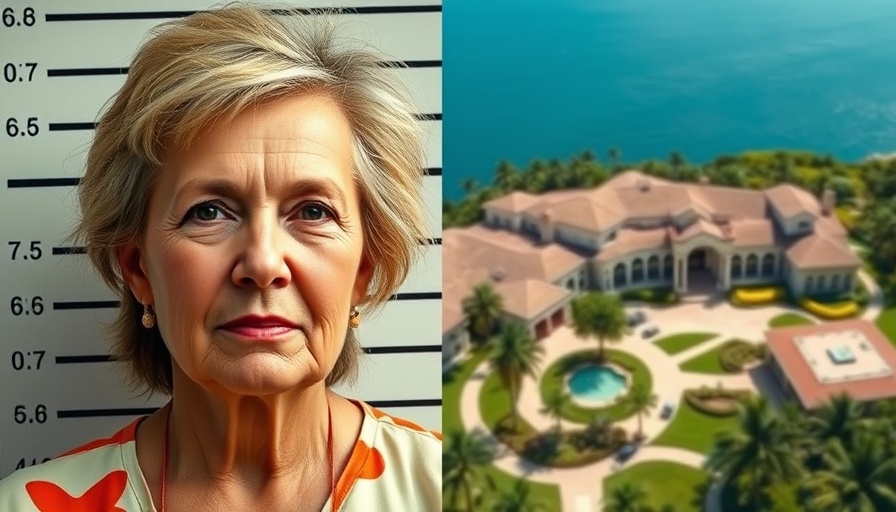
The Urgent Message: What Led to Caroline Shaw's Arrest?
On July 7, 2025, Caroline Shaw, a 49-year-old woman from Orlando, found herself at the center of a bizarre incident near Mar-a-Lago, the infamous estate of former President Donald Trump. Shaw drove a Mercedes van to the south gate of Trump’s residence, claiming she had an 'urgent message' for the president. As she approached the security checkpoint, she alerted Secret Service agents that there were guns located in her vehicle—a claim that quickly escalated the situation.
This incident highlighted not only the intensity surrounding Trump's persona but also the increasing number of security breaches at this high-profile location. Recent events at Mar-a-Lago have raised concerns about unauthorized access attempts, illustrating the vulnerabilities faced by a former president.
Rising Security Incidents: A Pattern Emerging?
Shaw's attempt to gain access to Trump’s estate is among several similar arrests in recent years. Following Shaw's case, there have been notable incidents including Zijie Li, a Chinese national arrested for multiple attempts to enter Mar-a-Lago, and Patrick Webster Warren, who was taken into custody after bypassing barricades claiming he sought an autograph. This pattern underscores the troubling reality of individuals attempting to breach security in hopes of reaching the former president.
Despite the seriousness of these incidents, many of the individuals apprehended appear to be struggling with mental health issues. This raises important questions about the support available for those facing such crises and the implications for national security.
Legal Consequences: Shaw's Charges and Repercussions
Caroline Shaw faces several legal problems following her arrest. She was detained for driving with a suspended license and having a vehicle with expired registration. Court records show that her license had been suspended for over a year due to unpaid fines. During her court appearance, a judge barred her from approaching Trump or his properties as the legal proceedings unfold.
The judiciary's response in cases of breach at Mar-a-Lago aims to deter potential threats, but it also emphasizes the urgent need for clear boundaries regarding mental health and public safety. Furthermore, the Palm Beach Police have filed a request for a risk protection order, preventing Shaw from possessing firearms or ammunition for at least a year.
Understanding the Motivations: Why Approach the Former President?
The need to approach a president, whether current or former, often stems from a complex interplay of societal, political, and personal motivations. For many individuals, the public figure represents hope or a voice for their own struggles. This emotional connection can lead to desperate acts, as seen in Shaw’s behavior. Understanding these motivations offers critical insight into the challenges of managing public security while recognizing the fragility of certain individuals’ mental states.
Public Reaction: The Balance of Sympathy and Security
Public reaction to Shaw’s arrest has been a blend of sympathy, concern, and criticism. Many express sympathy for a woman who may have been struggling and felt the desperate need to contact Trump for guidance or answers. However, others highlight the significant security threat posed by anyone attempting to approach a former president without going through appropriate channels.
As a society, we face the ongoing challenge of balancing compassion for those in distress with the critical need for security measures that protect public figures. This balance demands a nuanced approach in legislation and law enforcement practices to effectively address the underlying causes of such incidents.
Looking Ahead: What Does This Mean for Future Security?
The incidents at Mar-a-Lago, including Caroline Shaw's arrest, hold a mirror to broader sociopolitical stresses and the implications of public figures in polarized times. As we look to the future, there is a pressing need for improved mental health resources and educational programs that can help mitigate the types of desperate behaviors that lead individuals to approach powerful figures like the president.
Moreover, ongoing discussions about security protocols for public figures must include community engagement and crisis intervention strategies to ensure the safety of both the individuals involved and the public at large.
Ultimately, Shaw’s case reminds us that the intersection of mental health, public safety, and political celebrity is fraught with complexity, and navigating these challenges will require empathy and insight.
 Add Row
Add Row  Add
Add 





Write A Comment